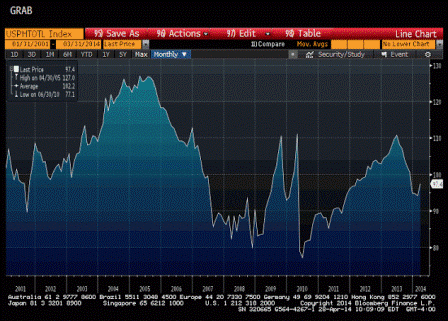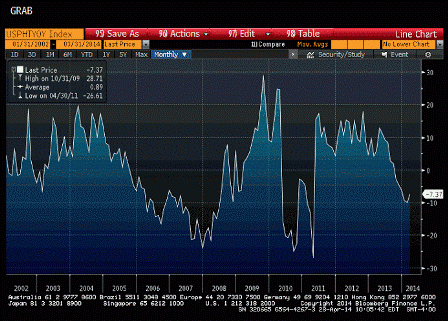This doesn’t add to GDP.
While a bit higher than expected, it’s yet another case of a ‘bounce’ that doesn’t even get up to where things were before the dip.
Furthermore, it seems that if it wasn’t for distressed sales, sales would have been substantially lower for the last several years. With distressed ‘bid hitting’ fading, prices are gravitating back to ‘non distressed’ offered prices, and price is high enough to be slowing things down while remaining below construction costs which is keeping a lid on new home building (which directly adds to gdp)
Home sales finally thaw, but just slightly
By Diana Olick
April 28 (CNBC) — U.S. home buyers signed more contracts to buy existing homes in March, as weather in much of the country warmed and as more listings came onto the market. An index of so-called “pending” home sales from the National Association of Realtors rose 3.4 percent from February, the first gain in nine months, but is still down 7.9 percent from March of 2013.
“After a dismal winter, more buyers got an opportunity to look at homes last month and are beginning to make contract offers,” Lawrence Yun, chief economist for the Realtors. “Sales activity is expected to steadily pick up as more inventory reaches the market, and from ongoing job creation in the economy.”
Regionally, sales in the Northeast increased 1.4 percent, but are 5.9 percent below a year ago. In the Midwest, sales slipped 0.8 percent and are 10.1 percent below March 2013. Pending home sales in the South rose 5.6 percent, but are 5.3 percent below a year ago. The index in the West increased 5.7 percent monthly, but is 11.1 percent below March, 2013. The Realtors still predict overall home sales for 2014 will come in lower than last year, at 4.9 million units sold.
Fast-rising home prices have caused at least some of the slowdown in sales during this spring season. In fact, prices in several major metropolitan markets hit new peaks in February. With median home values well above the national average, Denver, San Jose, Austin, Dallas and Houston hit new price highs, according to Black Knight Financial Services. Metropolitan markets in California made up eight of the top ten biggest price gains in February, with Portland, Ore., and Seattle, rounding out the list. Home prices fell in several Northeast and Midwest markets, like Cincinnati, Allentown, Pa. and Atlantic City, N.J. Nationally, home prices are still 13.5 percent below their June, 2006, peak, but that gap is closing fast.
Credit availability and cost are also keeping potential buyers on the sidelines. Despite anecdotal reports of a loosening in credit conditions, it is still far tougher to get a mortgage today than it was even prior to the housing boom.
Existing home sales:

Full size image
Existing home sales Y/Y:

Full size image
